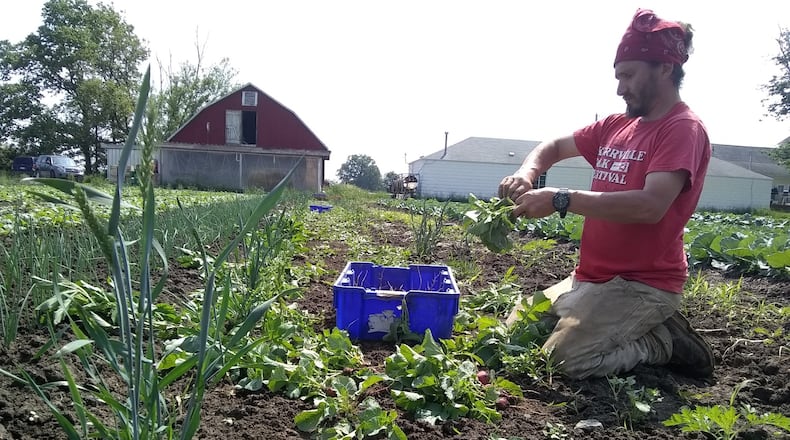The popularity of these farm shares has risen in recent years as more people want to know where their food came from and try to shop local.
MORE: Microgreens grown locally gain popularity at area grocery stores, restaurants
Data collected in 2015 by the U.S. Department of Agriculture indicates that 7,398 farms in the United States sold products directly to consumers through a community supported agriculture (CSA) arrangement. CSAs accounted for $226 million (or 7%) of the $3 billion in direct-to-consumer sales by farms in the U.S.
Patchwork Gardens, at 9057 W. Third St. in New Lebanon, started about 11 years ago and has grown from 30 to nearly 300 CSA members.
Laura Krugh, with Patchwork, said they hear from customers who like that their vegetables are grown in a chemical-free way and that it’s an automatic subscription delivered to their home.
“The CSA is perfect for people who want to eat locally, they want to eat with the seasons and they would appreciate the convenience of having the vegetables selected for them each week,” Krugh said.
For small farmers, these programs help because they mean committed customers who are bought into their business. Farmers also get to know the people eating their produce.
For consumers, they get access to a variety of fresh and nutritious food, and often get to learn more about food systems by having a relationship with local farmers.
“They’re committing to our farm to grow their vegetables and we’re committing to them to do the best we can to grow them vegetables, so the partnership is where the consumer and the farmer share in the risk and rewards,” said Emily Jackle, with Mile Creek Farm.
MORE: Growth of veganism boosts Dayton chef’s business
She said this is their 12th season as an CSA program, which started as an 18-week season and now they are up to a 24-week season with an extended season for those who want to continue to closer to 30 weeks of deliveries.
CSA programs are not for everyone, and some people will prefer going to the grocery store or shopping at farmer’s markets.
First, given the volume of vegetables, these farm shares are for people who truly enjoy eating fresh produce and are eating at home frequently enough to finish each order.
“People who have the most fun with the CSA and come back year after year are those who do a lot of cooking at home,” Jackle said.
Jackle said their customers are often interested in sustainability and want to know about whether their food is produced with sustainable practices and like that their vegetables traveled 10 miles from field to plate, not 2,000 miles.
Also, since customers don’t pick out which vegetables they are getting, the CSAs are for people who like to try new things. Many of the local farms have blogs or give out recipe cards with suggested ways to eat week’s delivery.
“They like being surprised and maybe pulled a little bit outside of their comfort zone,” Krugh said of their members.
Jane Caras, who just signed up for a third season with Mile Creek Farm in New Lebanon, said she’s gotten introduced to vegetables she’s never used or thought of buying, and the “the element of surprise” gets her to try new things.
“The first box I got from the farm, I pulled out the vegetables and laid them out on my counter and I didn’t know what half of them were. I enjoyed going to their blog where they explain what the vegetables are and they also have recipes,” Caras said.
How to learn more
• Patchwork Gardens
937-835-5807
eat.patchworkgardens@gmail.com
• Mile Creek Farm
Phone (call or text): 937-687-8762
Or search for other local CSA options at localharvest.org/csa/.
About the Author


